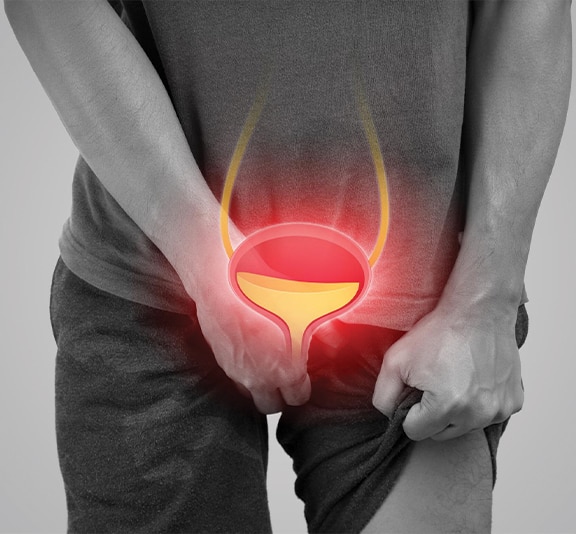
Prostatitis: Causes, Symptoms, and Treatment
Prostatitis is the inflammation of the prostate gland, which can cause pain, urinary problems, and discomfort. It can be acute (sudden and severe) or chronic (long-lasting). Unlike prostate enlargement (BPH) or prostate cancer, prostatitis can affect men of all ages, including younger men (under 50).
Types of Prostatitis
- Acute Bacterial Prostatitis – Sudden bacterial infection, often severe.
- Chronic Bacterial Prostatitis – Recurrent bacterial infection, lasting weeks or months.
- Chronic Prostatitis / Chronic Pelvic Pain Syndrome (CP/CPPS) – Most common type, with no bacterial infection but ongoing pain.
- Asymptomatic Prostatitis – No noticeable symptoms, often found accidentally during tests.
Causes & Risk Factors
Prostatitis can be caused by bacterial infections, nerve damage, or inflammation without infection. Risk factors include:
- Urinary tract infections (UTIs)
- Sexually transmitted infections (STIs) – Gonorrhea, chlamydia, etc.
- Prostate injury or trauma – Cycling, horseback riding, or surgery.
- Weakened immune system – Infections become more likely.
- Pelvic muscle dysfunction – Can trigger chronic pelvic pain.
Symptoms of Prostatitis
Symptoms vary depending on the type:
Acute Bacterial Prostatitis (Severe & Sudden Onset)
⚠ High fever, chills
⚠ Severe pevic pain (lower back, perineum)
⚠ Frequent, painful urination
⚠ Difficulty urinating or weak stream
⚠ Blood in urine or semen
⚠ Nausea, vomiting (severe infections)
Chronic Prostatitis / Chronic Pelvic Pain Syndrome (CP/CPPS)
Ongoing pelvic, groin, or lower back pain
Urinary urgency & frequency
Erectile dysfunction or pain after sex
Pain worsens after sitting for long periods
Asymptomatic Prostatitis (No Symptoms)
- Detected during routine prostate exams or infertility tests.
Diagnosis
Doctors diagnose prostatitis using:
- Physical Examination & Medical History
-
- Digital Rectal Exam (DRE) – Checks for prostate tenderness or swelling.
- Urine & Blood Tests
- Identifies infection or inflammation.
- Prostate-Specific Antigen (PSA) Test
- High PSA levels can indicate inflammation.
- Prostate Fluid Culture
- Checks for bacterial infection.
- Imaging (Ultrasound or MRI)
- For chronic or severe cases.
Treatment Options
1. Medications
- Antibiotics (Ciprofloxacin, Levofloxacin, Trimethoprim-Sulfamethoxazole) – First-line treatment for bacterial prostatitis.
- Alpha-blockers (Tamsulosin, Alfuzosin) – Help relax the prostate and bladder muscles.
- Anti-inflammatory drugs (Ibuprofen, Naproxen) – Reduce pain and swelling.
- Muscle relaxants (Diazepam, Baclofen) – Help relieve pelvic muscle spasms.
2. Home Remedies & Lifestyle Changes
Drink plenty of water – Flushes bacteria from the urinary tract.
Avoid caffeine, alcohol, and spicy foods – Reduces bladder irritation.
Warm sitz baths – Soothes pelvic pain.
Pelvic floor exercises (Kegels) – Strengthens bladder control.
Avoid sitting for long periods – Reduces pressure on the prostate.
3. Physical Therapy (For Chronic Prostatitis/CPPS)
- Pelvic floor therapy – Relieves muscle tension.
- Biofeedback therapy – Helps control muscle relaxation.
4. Surgery (For Severe Cases Only)
- Prostate massage or drainage – Helps remove trapped fluids.
- TURP (Transurethral Resection of the Prostate) – Rarely needed.
Complications (If Left Untreated)
Prostate abscess – A rare but serious bacterial infection
Chronic pelvic pain – Long-term discomfort.
Infertility – Due to poor semen quality.
Recurrent UTIs – Ongoing bacterial infections.
Prevention & Prostate Health Tips
Practice good hygiene – Prevent infections.
Stay sexually healthy – Use protection to avoid STIs.
Exercise regularly – Improves blood flow to the prostate.
Reduce stress – Chronic stress can trigger pelvic tension.
Get regular prostate checkups – Especially if you have recurring symptoms.
Prognosis & Outlook
- Acute prostatitis responds well to antibiotics if treated early.
- Chronic prostatitis may require long-term management.
- CP/CPPS can be frustrating, but a combination of therapy, medication, and lifestyle changes improves symptoms over time.
Would you like specific diet recommendations, exercises, or natural remedies for prostate health? 😊
You said:
Prostatitis ek aisi halat hai jo prostate gland ke sujan ya infection ki wajah se hoti hai. Yeh kisi bhi umr ke mardon ko prabhavit kar sakti hai, lekin zyadatar 50 saal se kam umr ke logon mein dekhi jati hai. Is bimari ke mukhya lakshan dard, jalan, aur peshab karne mein pareshaani hote hain. Kuch cases mein, yeh bacterial infection ki wajah se hoti hai, jabki kuch halaton mein iska koi spasht karan nahi hota. Iska ilaj bacterial prostatitis ke liye antibiotics se kiya jata hai, jabki chronic cases mein pain relievers aur lifestyle changes madadgar ho sakte hain. Samay par sahi diagnosis aur upchar is samasya se rahat dilane mein madad karta hai.

